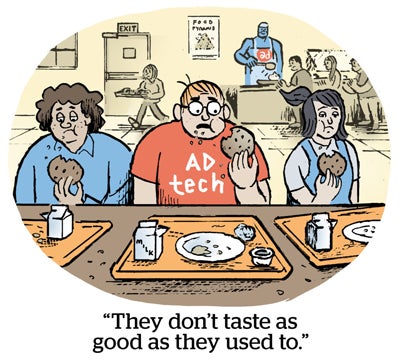Brands like Mercedes-Benz are reevaluating their approach to targeting as the clock (supposedly) ticks down on third-party cookies in Chrome.
One emerging alternative to the use of third-party cookies is predictive modeling that optimizes targeting using privacy-compliant data signals, such as weather and time of day.
Merkley + Partners, Mercedes-Benz’s agency, has been prioritizing this type of “identity-agnostic approach” to marketing for the past two years, said Hallie Bates, Merkley’s group director of technology and data.
The agency has been pushing for its brand partners to “do their homework now” by testing alternatives while cookies and device IDs are still around to measure against, Bates said.
The test drive
Mercedes-Benz recently worked with Merkley + Partners to test a cookieless targeting solution called SORT from Perion-owned Undertone and compare the results against both cookie-based targeting and contextual targeting.
Over the course of two campaign flights to promote its Certified Pre-Owned vehicle program, Mercedes-Benz tested SORT on video and rich media display ads across mobile and desktop.
The display ads featured animations and interactive elements, such as a dealer locator and a “click to play video” button.
The dual-purpose of the campaigns was to drive awareness for a Certified Pre-Owned sales event and to drive clicks to a dedicated landing page where customers could learn more about the event to try and spur purchase intent.
The SORT solution, as its name denotes, sorts users into what are called “SmartGroups” by analyzing real-time behavioral signals, including how people respond to and interact with rich-media ad placements.
The AI that powers the solution weighs anonymized data signals, such as what time of day ads see the most interaction, and learns over the course of a campaign what ads to serve and when [to serve them] based on those criteria, said Jaimee Schuster, a senior account executive at Undertone.
In this case, the AI was also trained to predict how key Mercedes-Benz audience segments – for example, sports and music fans, tech enthusiasts and people focused on building their careers – are likely to behave, Schuster said.
The campaign flights lasted about a month each, with one beginning in February and the other beginning in July, Bates said. Both were bought through programmatic guaranteed deals.
Cookies vs. context
Merkley ran an A/B test of the cookieless offering against both third-party, cookie-based targeting (which relied on tracking browser history) and against a contextual approach that targeted ads against automotive content, particularly content related to pre-owned vehicles.
Compared to cookie-based targeting, the SORT campaigns drove 200% more traffic to the landing page, a 71% higher interaction rate and a 53% higher click-through rate (CTR). Cookieless also won out against contextual targeting, with a 33% higher interaction rate and a 58% lift in CTR.
“Interaction rate was important because we wanted to make sure we were not only efficiently reaching audiences that we wanted to get in front of, but that there was attention and engagement,” Bates said. “We were also using [interaction rate] as an optimization signal.”
Based on these campaign results, Merkley has also started partnering with Undertone on cookieless campaigns for other clients, Bates said.
“When we think about an identity-agnostic world,” she said, “AI and ML are going to be the backbone of our approach.”












